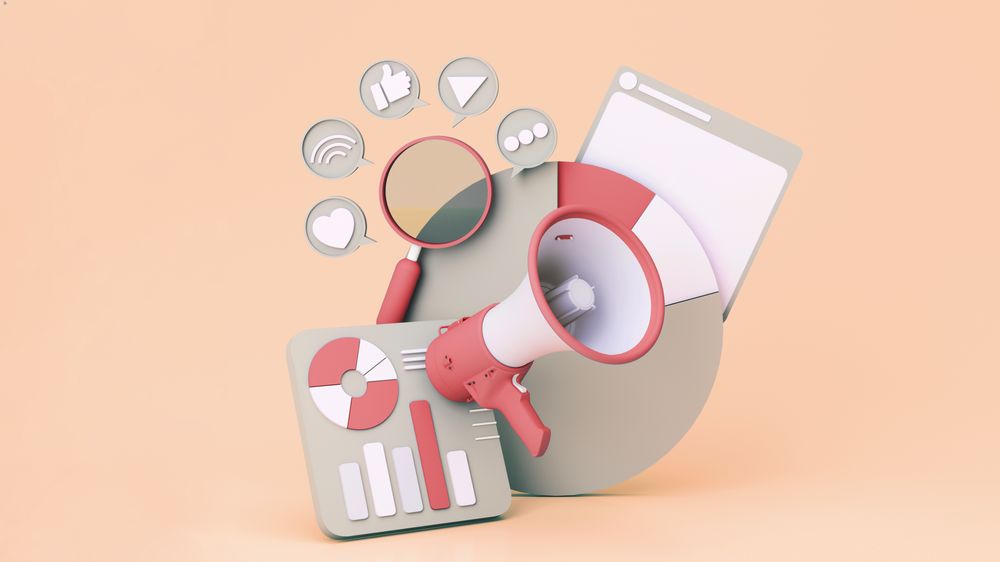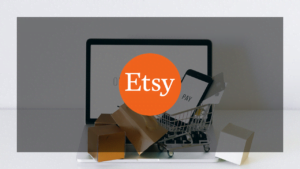Your Etsy shop is part of a marketplace with more than 89.1 million buyers in Q1 2022 alone. However, more than 5.5 million active sellers compete on the platform for these potential sales.
There are plenty of rewards for those able to attract and retain customers. But how do you stand out from the crowd and sell? Getting noticed and boosting your Etsy sales will require well-thought out marketing efforts.
Fear not, as this article will teach you how to market your Etsy shop.
You’ll learn how to target the right customer, tweak SEO and content, and use the best marketing tools on your Etsy shop. On top of that, we’ll dive into other marketing techniques to help you make informed decisions.
Let’s Cut to the Chase – How to Promote Your ETSY Shop?
An Etsy shop can benefit from many marketing tools and techniques to reach potential customers and increase sales.
Know Your Customer

The first step in your Etsy marketing efforts is knowing whom you’re talking to and targeting the right people most inclined to purchase what you offer.
A target audience is a specific group of individuals with common characteristics or similar interests. Directed ad campaigns should reach this group of potential customers – your product should answer these people’s needs, and they must know that.
How to Determine the Target Audience?
The process starts with research. Use the Stats section in Etsy’s Shop Manager and tools like Google Analytics and Google Trends to gather information on your current and ideal Etsy buyers.
Research for interests and keywords, and then use Google Trends to understand if the targeted inquiries are getting any interest.
For instance, if you sell organic t-shirts, look for that term in Trends and Analytics, and check who’s looking for it, in which country, and in what region. Check the following information:
- Demographics – age and gender.
- Geography – country, state, city, neighborhood.
The sections Related topics and Related queries offer additional search terms and valuable insights on the people looking for a product or Etsy items similar to yours.
By trying similar keywords and crossing the terms and searches, you may get more information on who may become your new customers, such as:
- Interests – preferred music genres, favorite books, entertainment fandoms, sports, hobbies.
- Purchase intention – apparel, tools, beauty products, smartphone cases, toys.
- Other – profession, education level, income, marital status, number of children.
Pro-tips on Researching Target Audiences
The target customer covers more than just the people who will use the product or the decision-maker who will purchase it. Supporters are people who heavily influence the buying decision, as in the case of children asking parents to buy a toy.
Sometimes a target audience buys the product for a different group. The Old Spice male brand, for instance, advertised targeting women as the market research revealed they’re the group buying the most male hygiene products.
Defining who your target customers are is a continuous process. It requires reevaluating, adapting, and constant monitoring of customers’ behaviors and needs.
Follow your Etsy stats carefully to understand your audience’s behavior to develop and cultivate a positive relationship with your customers.
Finally, take some time to watch our video to learn how to find your niche using Google trends and tools.
Yes, Content Is Still King
A fundamental step in any marketing strategy is to drive as much organic traffic to the website as possible.
SEO and Content Marketing are the right tools for that and work together – good SEO practices don’t redeem bad-quality content. In contrast, excellent content still needs good SEO to be visible.
The Etsy marketplace is a closed environment with specific rules, metrics, and rankings. However, quality content and search engine optimization matter even inside this closed environment, and there are ways to improve it.
These are the most critical elements to consider when optimizing your Etsy SEO:
- Keywords – Etsy offers Search analytics and stats in the Marketing section, with insights into keyword search and traffic.
Besides that, you can do specialized keyword research for Etsy with free and freemium tools such as Seller-way, eRank, and Marmalead.
Use the correct keywords wisely on your Etsy shop title, shop sections, categories, listings, and product descriptions. If the keyword is often searched on the internet and applies to your product, add it to the appropriate element.
- Product descriptions – Invest in quality product descriptions to ensure it’s clear what you offer to the customer. Use SEO keywords when possible.
- Titles – Keep the titles short with the most relevant keywords at the beginning. A title too long will only be displayed partially in search results.
- Tags – Etsy allows adding 13 tags to listings. Fill all of them with relevant product attributes and relevant keywords, including long-tail ones.
- Images – Provide good product photos. Visuals play a vital role in purchase decision-making, so don’t neglect them.
- Offer free shipping and add shipping rates to the product cost when possible, as shipping influences Etsy rankings.
SEO optimization is a continuous process. Stay tuned, proceed regularly with keyword research, and update the titles and tags on your Etsy shop accordingly.
Keep up to date with the latest on Etsy SEO in our blog. Also, don’t miss the Etsy SEO tips from our video.
An Etsy Blog?
While you can’t have a blog on the Etsy platform, it’s an excellent tool if you have an integrated website with Etsy. Try to maintain a blog and link to your Etsy shop. It’s one of the most significant resources to bring organic traffic to your store.
Here are some tips for improving your Etsy SEO with an external blog:
- Create new, good, quality content with SEO in mind. Start from the same keyword research used to know your target audience and create relevant content.
- Tighten your focus and write specific content related to your products. Avoid generic posts. Be informative and answer the needs of your customers.
- Publish continuously and regularly. Promote consistency and trust, and become an authority in your niche.
Social Media and ETSY

Social media is an effective and low-cost medium for advertising an Etsy shop.
Each social platform has its strengths and weaknesses. Different platforms will be best for different goals – from creating brand awareness and getting positive reviews to connecting with potential customers and sustaining relationships.
There are several ways to promote listings and even sell via social media on Etsy.
Basic Setup and General Options
- Before connecting Etsy with social media channels, create specific accounts for your Etsy shop on each social platform you use. Etsy connects with Facebook, Instagram, Pinterest, and Twitter.
- General Social Media Marketing settings can be accessed by going to Shop Manager -> Marketing -> Social Media.
- When you go to the Social Media section for the first time, you’ll see options to connect to the available social networks. You can access the same option later by clicking on Social Media -> Social accounts or the Listings section.
- To create social posts directly from the products, go to the Listings section, select the listing you want and click on Manage -> Share.
How to Promote Your Etsy Shop on Facebook and Instagram?
Meta products, including Instagram and Facebook, are the most popular social media platforms and should be included in any Etsy marketing strategy.
- To connect your Etsy shop to the Meta Business suite, go to Settings and click on Facebook shops.
- You can share listings via social media posts on Facebook and Instagram. You can do that from the Marketing and Social Media section.
- You’ll need the Sell on Etsy app to sell on Instagram.
Instagram is best for cross-promotions with Facebook and visual content.
Regarding relationship building and demographics, Instagram is good for reaching younger audiences and influencers.
Facebook offers a broader range of advertising possibilities for Etsy businesses – you can share Etsy products and listings, display pictures and videos, and integrate an Etsy shop into a Facebook page. In the last case, customers can buy directly from the Facebook shop.
Facebook groups are also amazing for engaging with different audiences.
Also, consider paid advertising with Facebook. You can create new product ads or boost existing posts from your business page. Customize and target specific audiences defined by demographics, location, or interests.
The weakest spot of Facebook is connecting to a younger audience, as it’s mainly used by Boomers. Still, you can address this issue with cross-promotion via Instagram.
Finally, keep informed of terms and conditions from the Meta business suite to avoid account and ad restrictions.
How to Promote Your Etsy Shop on Pinterest?
Pinterest has been integrated with Etsy for a longer time than the Meta business suite and can be accessed both in the Marketing section and the Integrations page.
The platform has branded itself as a catalog of ideas and a visual search engine. 85% of its users navigate the network to get inspiration and plan new projects, often buying merchandise for those purposes – 75% of the Pinners say they’re always shopping.
Pinterest focuses on image-driven content. Its edge with creatives resonates well with Etsy shoppers interested in artsy and vintage items, making the social media network a must-have marketing channel for Etsy sellers.
Pinterest Pins and Boards
You can create a pin from an Etsy listing while keeping the product information, and the pin will be linked directly to the Etsy store. Pinterest will provide insights and stats on the pins and the product. It’s possible to buy Etsy items from the saved pins.
To create a Pinterest pin from a listing, go to the Listings section, click on Manage and Share, or in the Social Media part of the Marketing section.
Pinterest boards are collections of pins, and you can use them to showcase collections of Etsy products.
Users can add Pins from other boards to their own, and Pinterest suggests similar pins to those the user adds. Therefore, your Etsy products with similar characteristics to the pins collected by Pinterest users may be displayed to them even without paid advertisement.
Starting Fresh on ETSY?
Perhaps you’re a new Etsy shop owner, own a small business, or still need to solve urgent issues, like picking and managing products.
Printify, Print on Demand, and dropshipping are tailored for solving such situations with low risk. First, integrating an Etsy shop with Printify is done within minutes. Printify also offers an immense and flexible catalog of high-quality products you can customize with the best prices on the market.
Finally, Printify handles the hassle of storage, managing inventory, and shipment, assisted by first-class merchant support 24/7 and a Help Center.
Integrate your Etsy store with Printify without delay and exponentially increase sales and your Etsy success.
Grow Your Email Database and Use It for Selling

Email marketing can inform your customer base about new products, updates, blog posts, interviews, promotions, and seasonal publicity.
The resource is very effective for connecting with customers who have already demonstrated interest in your brand. It fosters relationships with potential and return customers and keeps them informed about what your Etsy shop offers. Emails can keep your audience engaged and connected.
Additionally, email listings help your metrics substantially, gathering data and information on what appeals to new and repeat customers and gets them engaged.
Getting Subscribers
Firstly, never add an email address to your list without asking for the owner’s consent. That goes without saying – it’s against Etsy policies, illegal in several countries, not to mention it’s unpleasant and unwanted behavior more likely to alienate valuable customers and defame a brand.
Subscribers can opt-in for your newsletter through social media channels, on a dedicated website, or even in-person through traditional paper lists if you have the opportunity to present your Etsy shop products at fairs or other live locations.
Make subscribing as easy as possible. If you own a blog or website outside your Etsy shop, widgets for signing up can be added. Add call-to-action buttons in your Facebook shops. Build relationships with your subscribers through social media and Facebook groups.
Offer customers the option of trading an email address for free products or services. It can be an e-book with expanded content, DIY instructions, exclusive video tutorials, an Etsy promotion, or coupon codes.
Pro Tips on Email Marketing With Etsy
- Be careful with spam trigger words, like free, winner, and contest. Use free checkers like Blogiestools or Mailmeteor for up-to-date spam trigger lists.
- Be consistent. Email marketing is a strategy to develop relationships and develop data, but also to generate trust. Ensure formatting consistency in a variety of devices and send test emails.
Keep a regular schedule as much as possible. The soft spot of sending email marketing is between no more than one email per week and no less than one email per month.
- Use image optimizers to reduce the size of photos. Larger pictures may trigger spam alerts, block your emails, and take longer to load on mobile devices. Also, take the time to edit all alt texts in the pictures to ensure your message is clear and readable if the images don’t load properly.
- Review and adapt – After sending some emails, use the available tools and analytics or dedicated email marketing tools such as Mailchimp to check which links and content brought more engagement and resulted in conversions.
Observe variants like the size of the photos and how long the text descriptions are, and build on that.
Setup ETSY Ads
Etsy ads, also known as promoted listings, are effective when associated with SEO optimization and other Etsy marketing practices.
After optimizing product listings descriptions and SEO, Etsy sellers may start an ad advertising campaign following these steps:
- Go to the Shop Manager.
- Click on Marketing, Etsy Ads, and Get Started.
- If this is the first time setting up Etsy ads, specify your goals as required.
- Set the daily budget from a minimum of $1.00.
- Click Start Advertising.
Etsy Offsite Ads
In addition to the promoted listings, Etsy also provides an offsite ads program. Previously restricted to Google Shopping, the program evolved in promoting products selected mainly through the Etsy quality score in search engines and social media platforms.
In the case of conversions, Etsy will charge a 15% fee for sellers with annual sales below $10,000 and 12% for those above that threshold.
Many sellers would consider it a win-win situation as there’s no initial investment or risk. However, Etsy uses cookies for tracking the ads for 30 days. In the case of repeat purchases after a click during that period, the fee will be charged by purchase.
Also, the seller has no say on the products advertised, and only shops below the $10,000 cap can opt out from the program. Opting out is possible via the Shop Manager in the Settings section. Click on Offsite ads and Stop promoting my products.
If Etsy repeatedly advertises some shop product on external platforms, carefully calculate your profit margin, shipping rates, and other fees to avoid potential financial loss in future purchases.
Don’t forget to check our complete guide on Etsy Advertising.
ETSY Search Engine Marketing

Search engine marketing (SEM) places paid ads – or pay-per-click (PPC) advertisements – on search engine results pages. It differs from PPC on social media platforms.
PPC for SEM may consist of small and text-only ads or may include complete product advertisements with pictures, prices, and reviews.
SEM is a cost-effective way of bringing traffic and conversions to an Etsy shop. Etsy offsite advertising includes SEM and advertising on social media pages, but the sellers don’t have a say on what’s advertised.
For those interested in controlling their SEM campaigns independently of Etsy offsite advertisement, the best options are creating an account with Google ads or Microsoft ads (previously, Bing ads).
Even though a higher bid amount may increase the chances of an ad appearing in the search results, paying more is not the most decisive factor for SEM.
The Quality Score is the most relevant factor for displaying a product advertised with PPC in the Google search results.
Google defines it by click-through rate (CTR), the relevance of keywords and ad texts, landing page relevance and quality, and Google Ads account history.
In short, SEM is diverse and complementary to SEO and social media advertising. Still, all forms of advertising share some fundamentals, starting with keyword research and depending on quality content.
ETSY Give Affiliate Marketing a Go
Affiliate marketing is an option for expanding the reach of your business and increasing your Etsy sales.
Partnering with a reputable influencer or brand ambassador may impact a shop’s range and sales considerably, as it can benefit from the traffic and trust from these individuals or pages.
Awin manages the Etsy affiliate program. It encourages other websites to refer their users to an Etsy shop. If one of these users purchases in the shop, the website owner will receive a commission of 4% of the order price.
Like the Etsy ads program, Etsy will use cookies to track returning customers and sales and charge an eventual next purchase accordingly. For affiliates, cookies will track for 30 days on the web but seven in the Etsy app.
There’s no need to sign a contract to join the Etsy affiliate program. The shop owner needs to agree to Awin’s terms and conditions. It’s possible to leave the program at any time. Similarly, Etsy can also remove affiliates without short notice.
Stay informed of any changes in the Etsy affiliate program and Awin’s terms and conditions, especially regarding fees.
Also, you can learn more about affiliate marketing and its latest trends on our blog.
It’s Your Time to Start Marketing

This article explained how to market your Etsy shop, including the main marketing strategies recommended for increasing the search ranking, shop traffic, and sales:
- Know your customer – focus on the client, and know who your target customer is.
- SEO and quality content – improve your Etsy store for SEO and invest in quality content.
- Social media marketing – How to promote an Etsy shop on Instagram, Facebook, and Pinterest.
- Email marketing – build and sustain relationships, and keep your audience engaged.
- Etsy advertising – advertise inside and outside Etsy with PPC ads.
- SEM – go further with PPC and control what you advertise on search engines.
- Affiliate marketing – partner with reputable influencers and websites and benefit from their reach.
Now you’re well-prepared to develop and implement your e-commerce marketing strategy on Etsy and stand out from the competition.






